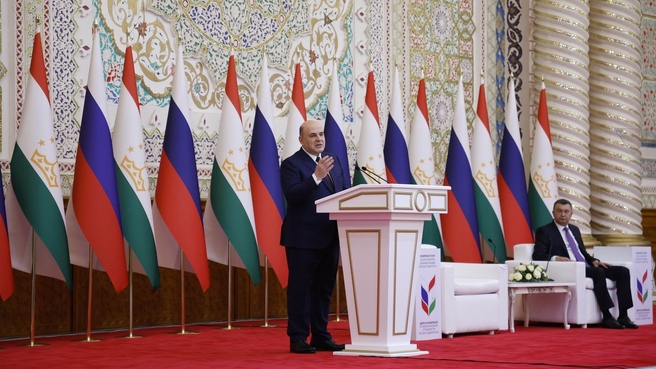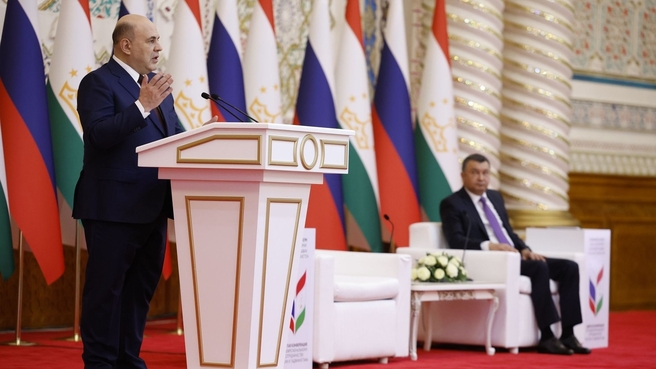The Prime Minister delivered his remarks at the plenary session of the conference held in Dushanbe on March 2–3.
Mikhail Mishustin’s remarks:
Mikhail Mishustin speaks at the 9th Business and Investment Partnership between Russia and Tajikistan conference on interregional cooperation
Mr Rasulzoda, ladies and gentlemen.
First of all, I would like to personally thank respected President Emomali Rahmon and Prime Minister Kokhir Rasulzoda for the warm welcome that the Russian delegation received and for the excellent organisation of such a significant and large event as today’s forum.
The conference is being held for the ninth time and has over 1,000 participants. Representatives from 16 Russian regions and more than 200 companies have come to Dushanbe. This reaffirms our mutual interest in promoting cooperation in various fields.
Russia and Tajikistan have strong relations of strategic partnership and alliance.
Trade and economic cooperation are developing dynamically. By the end of last year, trade had increased 18 percent to $1.5 billion. This is a record figure for the past 20 years, but it is still not a lot.
Russia ranks among the leading investors in Tajikistan. Total investment volumes exceed $1.5 billion.
Russian companies are operating in basic economic sectors, including the construction and power sectors, in industry, communications and financial services. We are increasing our cooperation in healthcare, education and tourism. All of our ministers in charge of these areas are here today.
We are expanding industrial cooperation in various fields, including light industry, mining and metals processing. We are ready to launch joint ventures that will facilitate the complete production cycle in the interests of Russia and Tajikistan.
Interaction between regions has become a basic part of deeper trade and economic, science and technological, cultural and humanitarian ties between our countries.
Today, 70 regions in the Russian Federation maintain direct contacts with the republic’s regions and districts and, of course, with the capital of Tajikistan. Moscow, St Petersburg, Tatarstan, Bashkortostan, and the Astrakhan, Nizhny Novgorod, Chelyabinsk and Yaroslavl regions are the most active.
We are constantly upgrading the regulatory framework, and we have signed over 80 agreements and memorandums on cooperation in the most diverse spheres. Mutual visits of business missions have become a good practice. I do not doubt that by launching cooperation between businesspeople and by involving more regions, we will be able to implement new and promising projects. Today’s conference makes it possible to study and discuss these ideas in detail.
Dear friends!
We are working in a complicated environment, amid global economic turbulence and geo-strategic tensions that influence all aspects of our activity. Various factors contribute to this state of affairs, including systemic mistakes in the financial and economic policies of the Western countries, aggravated geopolitical disagreements and contradictions and the introduction of unilateral and illegitimate sanctions against Russia by the United States and its allies.
We are successfully countering this pressure, and we are maintaining economic stability and resilience despite the negative forecasts. We are taking action to stabilise the situation on the labour market. We are supporting our citizens and companies. Our businesses are reorganising logistics and refocusing on working with responsible and reliable partners.
In his address to the Federal Assembly last week, Vladimir Putin emphasised that Russia is an open country, yet a distinct civilisation. And we will strengthen relations with our friends. With everyone who is ready to work together.
New opportunities are opening up before us. We can competently use the abundant potential of our national economies and our experience of strategic partnership and allied cooperation to launch promising projects, expand trade relations and, ultimately, take cooperation to a higher level for the benefit of the citizens of Russia and Tajikistan.
We propose that our Tajik partners cooperate more actively with the Eurasian Economic Union. The Eurasian Economic Union is one of the leading international associations and has proved its stability even under the current difficult circumstances.
Together with our colleagues in the EAEU five member states, we ensure free movement of goods, services, capital and labour throughout the Union. We are developing a common market of more than 180 million consumers. We do everything necessary to create comfortable conditions for doing business.
Tajikistan’s interaction with the EAEU would open unique opportunities to join in-demand projects. And there are many of them.
We pay special attention to deepening industrial cooperation and opening new high-tech production facilities in strategically important sectors. To this end, the Union member states have agreed to launch a common mechanism for supranational subsidies for such joint projects within the EAEU. Their implementation will be financed at preferential rates. This will support breakthrough ideas. And even small economies will have greater access to the development of advanced technologies.
Another initiative of the Union is aimed at increasing the export potential of the member states. This is the Eurasian Agro-Express. Thanks to it, agricultural produce is being transported by rail at an accelerated rate. Almost 500,000 tonnes have already been transported. We support development of the project with the participation of new partners.
The establishment of modern logistics chains will be a good incentive for agricultural producers in Russia and Tajikistan, and will make a significant contribution to global food security.
It is notable that cooperation between Russia and Tajikistan is not limited to the economic agenda. They are also actively developing their cultural interaction.
I would like to place special emphasis on our cooperation in education.
An important event in that sphere was launched last year by President of Russia Vladimir Putin and President of Tajikistan Emomali Rahmon.
On 1 September, schools built by the Russian Federation opened in five Tajik cities. Lessons there are conducted in the Russian language and according to Russian educational standards. The curriculum includes lessons on the history, state language and geography of Tajikistan.
We visited one of them, the school named after the world’s first cosmonaut, Yuri Gagarin, right before this conference. Its pupils have lessons based on Russian curricula, which means that they can learn more about our country.
We offer young people from Tajikistan the opportunity to receive professional education in Russia. Today we talked about this with the school’s pupils, who asked what they should do to continue their education in Russia. Tajik students are studying at universities in Moscow, St Petersburg, Ufa, Kazan, Nizhny Novgorod, Chelyabinsk, Yekaterinburg, Novosibirsk, Barnaul and other Russian cities.
In accordance with the agreements reached between President Putin and President Rahmon, we have increased the government quota for Tajik students at Russian universities for the next academic year.
Tajik citizens can also receive a higher education without leaving their republic, at the Russian-Tajik (Slavonic) University and the branches of Russian universities in Tajikistan.
Russia and Tajikistan have a rich history and culture and unique traditions. Our people should have the ability to further strengthen their friendship, and such programmes offer an opportunity for this. We are supporting and will continue to support them.
I would like to use this occasion to invite Tajik businesspeople and officials to Russia. We plan to hold a number of major international events, which they will find interesting and beneficial.
In May, Kazan, a wonderful city, will host a Russia-Islamic World Forum. It will help us expand contacts in the fields of finance, investment, enterprise, high-tech industries and construction.
In early June, we invite you to Sochi, where we will hold the meetings of the CIS Heads of Government Council and the Eurasian Intergovernmental Council, an international exhibition of cooperation projects titled Eurasia Is Our Home, the Eurasian Congress, and the Youth Forum of the CIS and the EAEU. All of them offer an opportunity to exchange experience and ideas on boosting the development of our countries in the current complicated circumstances.
Friends,
I would like to wish fruitful discussions, stable business ties, mutually beneficial contracts and solid friendship to the participants of today’s conference.













